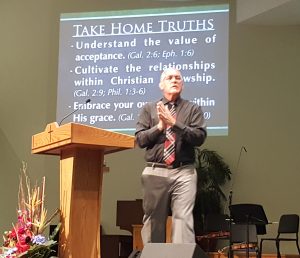 When My wife and I married as widow and widower almost two years ago, her two and my five gave us seven adult, married children, and her six and my ten gave us sixteen grandchildren. For years we have observed ten of the older grandchildren going through the process of seeking “God’s will for their lives”. We are grateful to our Lord that several already know their “calling” and are either active in their calling or pursuing the needed education for what God would have them to do with their lives.
When My wife and I married as widow and widower almost two years ago, her two and my five gave us seven adult, married children, and her six and my ten gave us sixteen grandchildren. For years we have observed ten of the older grandchildren going through the process of seeking “God’s will for their lives”. We are grateful to our Lord that several already know their “calling” and are either active in their calling or pursuing the needed education for what God would have them to do with their lives.
Millions of “the youth of America” are living their lives in search of “God’s will” for their lives. While this pursuit is extremely important, knowing God’s will in everyday living is equally important.
Here are a few questions you might ask yourself in your pursuit of knowing God’s will about a decision you’re needing to make today.
Before we get to those questions, let’s consider the powerful resources available. First, you must use the Word of God, because it is primary in divine guidance. Next, you must depend on the witness of the Spirit, which is only available to those who have been born again by faith in Jesus Christ as Savior. Finally, God makes His will clear through circumstances and the category of the obvious or common sense, which affect the decisions we weigh.
When considering God’s will about a matter ask yourself these self-evident questions.
DOES IT MAKE SENSE?
In 1 Peter 3 we find the Apostle Peter urging his people to “be of sound judgment”. Throughout the Proverbs Solomon advises us to “be of sound mind”.
He also told us to “…lean not to your own understanding.” However, when that teaching is used, it is not teaching us to shift our minds into neutral before we make a decision.
Biblical truth tells us that the use of the verb sophroneo means “to be of sound mind, “to be reasonable, sensible“. In other words, use good “common sense”. Paul used the adjective form of the same word when he said that elders should be “sensible”. He used the adverb form when he declared that the grace of God teaches us “to live sensibly”.
Depending on the power of the Holy Spirit to enlighten and sanctify our decision-making process is the only way possible for us to have a well-balanced decision. We cannot depend upon or “lean upon” human wisdom alone. That is the impact of what Solomon was saying in Proverbs 3:5 “…lean not to your own understanding.”
If we use the good sense God has given us, He will do the things we cannot do. The prime example in the Bible is Abraham. He obeyed God in total faith, because it was not only God’s will, but also a direct command given by God.
What God requested Abraham to do didn’t measure up to “human reasoning”, but He obeyed God simply by his total faith in God …he knew it was what God wanted him to do.
All common sense must be subject to the scrutiny of God’s Word.
IS THIS WHAT I OUGHT TO DO?
God has placed within every human a conscience which He uses to let you know what you “ought to do”.
The conscience can be used to accuse or defend us or to guide us. The results of ignoring its voice and neglecting to heed its warnings is a seared conscience. When you get to that point, you will begin to allow and attempt to justify things which are not what you ought to do.
A conscience can be defiled, that’s to say, common or unclean. A lack of discipline through life may distort the conscience so that it allows things which God forbids. Each person’s conscience is conditioned by knowledge, experience, and training, so it too must always be measured by the Word of God.
 A seared or defiled conscience will inevitably rely on human reasoning, which many times winds up “attempting to justify” a decision which is directly opposed to God’s word.
A seared or defiled conscience will inevitably rely on human reasoning, which many times winds up “attempting to justify” a decision which is directly opposed to God’s word.
Once you know “what you ought to do”, do it! Apologize to that person you wronged. Share Christ with that friend whose heart is open. Fix that leaky faucet your wife has been after you about. Pay back that money you borrowed. You don’t need to pray about it. It’s your duty.
Prayerfully heed the voice of conscience. It may be expressing the will of God.
WHAT ARE MY QUALIFICATIONS?
When a man is nominated to serve as deacon, he should seriously consider whether he is qualified. After carefully examining scriptural requirements and having a “conference” with his pastor, he needs to consider whether he can give the amount of time required to serve and whether he has the complete support of his wife. 
Such careful consideration must be given by anyone being considered for any leadership or service position in the local church as well as any other opportunity arising throughout every day of your life.
This advice is not just for one’s life-time calling. It applies also to local church activities, in which everyone should be involved. We may not have a specific qualifying-type “responsibility” in our local church, but everyone is required to participate even if it is only attendance. The Bible makes it clear, consistent attendance to praise and worship with brothers and sisters in Christ is required for Christians. Everyone is qualified for this activity unless providentially hindered, of course.
SHOULD I CONFER WITH SOMEONE?
If you are the only person of your “faith” who thinks your decision is right, I suggest you go back to God in prayer. This isn’t to say that you’re always wrong when the majority disagrees, but it does reinforce that God has brought us together into one body so that we can minister to one another. At least reconsider your decision, if no one else agrees with your decision.
“Where no counsel is, the people fall: but in the multitude of counselors there is safety.” Proverbs 11:14. Question, with whom did you seek counsel? “Hear counsel, and receive instruction, that thou mayest be wise in thy latter end.” Proverbs 19:20. It really doesn’t take the mind of a “rocket scientist” to understand the plain teaching of “ God’s Word”.
New Testament writers agree with this teaching. Paul exhorts us to admonish one another. The word means literally “to put in the mind,” therefore, “to instruct or to warn one another.”
Obviously we are to instruct and warn a brother or sister in Christ when they are allowing something in their lives which is contrary to teachings of the truths of God’s Word. We are not to give comfort and encouragement to them in that situation.
Have you considered that other people might be able to consider your decision more objectively? What do you have to lose by seeking the advice of mature Christian friends – pastors, elders, teachers, and family members? God put certain people in places of responsibility to help you, and it would be foolish to completely disregard their input or advice.
Be careful not to make Ahab’s mistake. He only wanted to hear from those who would tell him only what he wanted to hear. We may be tempted to avoid anyone who would disagree with us, but if they are spiritually minded people who know the Word, we would do well to hear them out.
 In Conclusion: My wife and I are in the beginning days of our final quarter in life. Our ears “perk up” when we hear things like “the clock’s ticking”, “Lost time is never found again”, ” ….all we have to do is decide what to do with the time God has given us”, and let’s not forget the admonition from scripture, Ephesians 5:16 “Redeeming the time, because the days are evil” and Proverbs 27:1 “Do not boast about tomorrow. For you do not know what a day may bring forth.”
In Conclusion: My wife and I are in the beginning days of our final quarter in life. Our ears “perk up” when we hear things like “the clock’s ticking”, “Lost time is never found again”, ” ….all we have to do is decide what to do with the time God has given us”, and let’s not forget the admonition from scripture, Ephesians 5:16 “Redeeming the time, because the days are evil” and Proverbs 27:1 “Do not boast about tomorrow. For you do not know what a day may bring forth.”
We thank God at the beginning of each day that He has given us the day. Not only are we to “….rejoice and be glad in it”, but also to ask God to direct our paths for the day to do His will, not ours.
